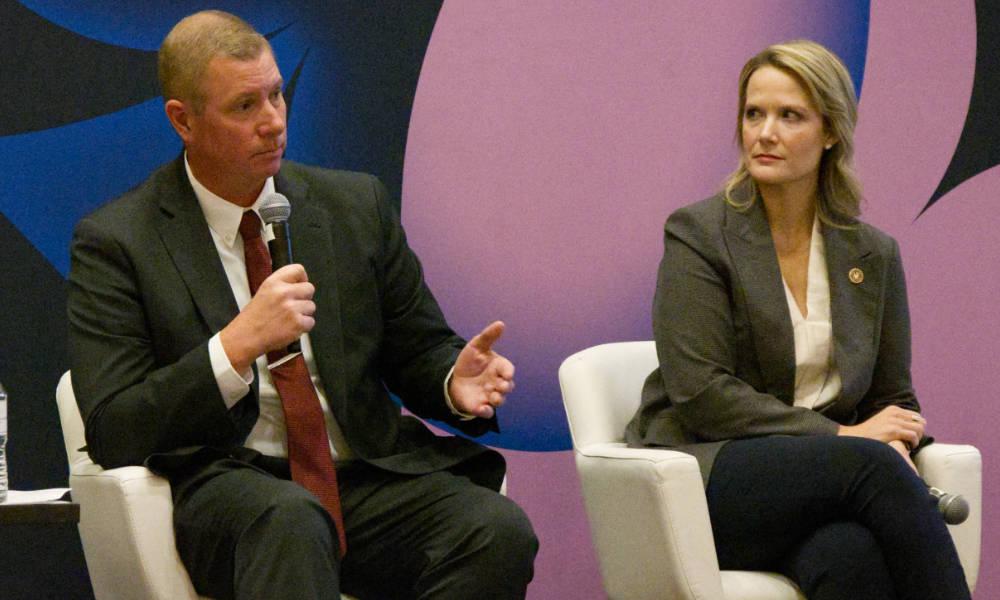“We’re still talking about $550 billion a year” in illegal igaming and online sports betting (OSB), lamented Tres York, vice president of the American Gaming Association at Global Gaming Expo. But he wasn’t without hope. “In the last year, we’ve seen a tidal wave of actions” at the state level, York said.
Two of the responsible officials sat on York’s panel, “Fighting Back: How States are Addressing Illegal and Unregulated Gambling.” His guests included Kurt Steinkamp, chief of staff for the Michigan Gaming Control Board, and Dawn Himel, director of the Gaming Division of the State of Louisiana. York’s third guest was FanDuel’s head of U.S.- and state-government relations, César Fernandez.
According to York, 20 states have issued cease-and-desist letters to offshore operators. GeoComply research has shown that in five states that have taken action, there has been 10 percent growth in active players and 39 percent more accounts have been opened than in states that have been passive.
“If we take these kinds of actions, will we see compliance?” York queried. He left the answer to his panelists.
Steinkamp began by saying that it had been 16 months since Michigan sent its first cease-and-desist letter, to Bovada, at a point at which federal-level action had been hitherto thought essential. “We felt there was some opportunity there and what do we have to lose? Maybe a little egg on our face.”
Michigan gave Bovada two weeks to exit the state and it did. “It was a bit of a shock,” Steinkamp recalled.
Twelve letters were sent in 2024, followed by 155 in 2025 to date. “The reason that we’re succeeding is that we’re very public about it,” Steinkamp explained. The state not only issues a press release along with each letter, it maintains a public list of the offending companies.
Steinkamp said Michigan is approaching 50 percent compliance. “The question is, what do we do next? The short answer is attack the infrastructure,” whether that be data providers, game supplies, or ISPs.
According to Himmel, Louisiana has a more complicated regulatory structure, involving its Gaming Control Board, the state police, and the racing commission. The attorney general’s office, for which she works, represents all three.
When Louisiana sends out a cease-and-desist letter, Himmel said, it tailors it to each individual operator, detailing its offenses. Although Louisiana also got less than 50 percent compliance, those that did defended the legality of their operations, even as they withdrew from the fray.
Those that don’t comply face investigation and potential prosecution. “We’re not gracious with discovery,” Himmel warned. “That seems to make them back down a little.”
Part of her problem, Himmel said, is public hostility. When she tries to warn people off of illegal gambling sites, the response is often, “Who are you to tell me what to do with my money?”
Louisiana gaming companies are prohibited from lobbying the legislature, Himmel added, but illegal operators face no such constraint. “It always seems like the people doing the right thing are the ones being punished,” she said.
Offering a legal operator’s perspective, Fernandez said companies like his are oriented toward market share. “The reality is, the illegal market is FanDuel’s number-one competitor,” he said.
In U.S. states without OSB or igaming, 80 percent of Google searches seek out unlawful sites. When states legalize igaming and OSB, those numbers flip, Fernandez revealed. “It shows the overnight impact that creating a regulated environment has on the open market.”
Fernandez also complained that anti-money-laundering rules, taxes, and other forms of compliance make for a “wildly different” cost structure for legitimate operators, creating a competitive disadvantage. “The only way to compete is to have a relatively low tax structure and barrier of entry.”
For every $100 made by a FanDuel, Fernandez said, $90 goes back to the bettors, $3 to taxes, and $2 to regulatory costs. However, states are coming back for the remaining $5 in the form of ever-higher taxes.
The first operator response is to cut back on marketing costs, which helps drive the public toward illegal sites, Fernandez said. To make his point, he cited a hypothetical offshore site based in Belarus buying large, cheap, ad blocs on social media.
State attorneys general, Fernandez continued, “are really not equipped to go after the illegal market. They can’t levy penalties on the malefactors. That power lies with district attorneys “and those offices are extremely constrained in terms of resources.”
This raised the question of what federal Attorney General Pam Bondi might be doing, or not doing, having been petitioned by all 50 state attorneys general. “Hopefully, there will be some action taken,” said York, pointing to the Obama administration’s 2011 crackdown on online poker, “Black Friday.”
“There are other priorities going on” at the federal level, Steinkamp said in Bondi’s defense. “There’s interest in prosecuting illegal gaming. Dealing with the federal government is a one-way street. Maybe they have some sweeping action that will come out tomorrow. But they have their agenda. Is it going to be tomorrow? Ten years from now? I don’t know.”
“This is probably the best window we’ve had in a while,” added Fernandez.



